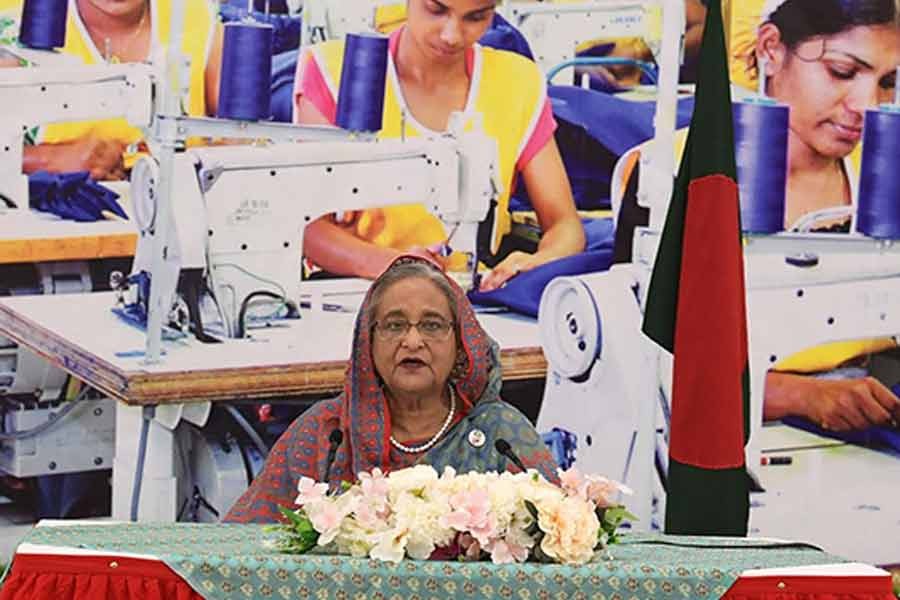Prime Minister Sheikh Hasina on Wednesday called for a ‘vigorous worldwide response’ with the participation of all countries to combat the adverse impacts of the coronavirus pandemic on the migrants as she placed a three-point suggestion to this end, reports BSS.
“The virus does not discriminate but its adverse impacts severely discriminate against the vulnerable, especially the migrants and women workers,” she told a virtual global summit of the International Labour Organisation (ILO) in Geneva, Switzerland.
Sheikh Hasina added: “I must say that a vigorous, well-coordinated and world-wide response with the participation of all countries, international organisations, civil society organisations and private sector is needed now.”
The three point- suggestion placed by the premier at the event titled “ILO’s ‘Global Leaders’ Day” are:
Firstly: Jobs of migrant workers at the overseas markets must be retained during this crisis;
Secondly: In case of lay-off, compensation and other dismissal benefits must be paid in full along with ensuring their safety and health benefits; and
Thirdly: After the pandemic, these workers would have to be recruited for reactivating the economy.
Sharing Bangladesh’s experiences and measures on how the country is dealing with the crisis, the premier said Bangladesh deeply appreciates ILO’s all endeavours.
“I’m happy to join this event on ILO’s ‘Global Leaders’ Day’ during the global COVID-19 pandemic that has affected our nations, especially our workers the most,” she said.
Sheikh Hasina said this global calamity has now threatened the very base of globalization and connectivity that all of us have carefully built over the years.
“This is no longer just a health problem but becomes a full-fledged global economic and social crisis,” the premier said.
Like many other crises, she said, the LDCs and developing countries are facing the main burden although the crisis did not start with them.
“During this pandemic, our domestic and external supply chains were severely disrupted. We lost export orders of billions of dollars, many of our industries were closed and millions of workers lost their jobs,” she said.
Sheikh Hasina said Bangladesh’s small industries lost most of its resources and markets, and above all, its agriculture suffered huge loss due to supply chain disruption.
“On the back of it, we are hosting 1.1 million forcibly evicted Rohingyas from Myanmar,” she said.
The prime minister said when the crisis of COVID-19 began to unfold, the government immediately announced a 12.1-billion-dollar stimulus package for various sectors of the country’s economy as well as support to different segments of the society.
“This support package is equivalent to 3.7 per cent of our GDP. To support our workers in export industries, we have given about 1 billion dollar for paying wages of the workers,” she said.
The premier said her government hiked wages of the garments workers by almost 500 per cent and also workers of other sectors by on an average 360 per cent since it assumed office in 2009.
“We provided cash and other incentives directly to more than 50 million people who lost their daily income during this pandemic,” she said.
Mentioning the huge loss of jobs of Bangladeshi migrant workers and the resulting shortfall in remittance, Sheikh Hasina said it is a great concern for us as remittance is a key component to achieve the SDGs.
“Currently, repatriation of these jobless migrant workers has proved to be a huge challenge. The World Bank predicted that we will lose more than 20 per cent of our earnings from remittance,” the prime minister said.
“Under these circumstances, we may remember the Centenary Declaration of ILO where all of us recognised to transform our world through technological innovation, demographic shifts, climate change and globalisation,” she added.
Sheikh Hasina said UN and international organizations will be at the centre of all recovery measures to be supported by G-7, G-20, OECD and international financial institutions.
“With everything happening all around us, the promises of decent jobs for all seem hard to realise individually, but I am convinced that together, we can do it,” she said.
Tuomo Poutiainen, ILO Country Director for Bangladesh expressed his appreciation for the way in which the Government, employers and workers’ organisations have worked together to tackle the safe return to work, unemployment and business challenges brought on by COVID-19.
“While addressing the numerous challenges we all face today, it is important that we continue working together for the future in developing robust social protection schemes and investing in skilling and jobs programmes for youth, women and others in vulnerable situations,” Poutiainen said.
The Global Summit examined a range of issues, including:
How to promote full and productive employment in this new environment.
What needs to be done to address the massive vulnerabilities in the world of work made evident by the pandemic.
Which workers require particular support and attention.
How to position the reduction and elimination of poverty as central objectives of the recovery process.
How the international community can come together with real common purpose and rededicate itself to the delivery of the UN’s 2030 Agenda.
On July 09, labour ministers, workers’ and employers’ leaders from ILO member States will reflect on the previous days’ events and discuss the implementation of the ILO Centenary Declaration for the Future of Work in the context of the pandemic.
Begum Monnujan Sufian, state minister for labour and employment, will address the audience on behalf of Bangladesh.


